PowerPoint is one of the most used Microsoft software for professionals. Whether sharing ideas with your in-house team, pitching in front of investors, or presenting academic stuff, PowerPoint does it all. But, to ensure the confidentiality of your sensitive information, you need to password-protect PowerPoint presentations.
That's where UPDF comes in handy. Let's discuss what it means and how to password-protect PowerPoint files from unwanted intrusions.
Windows • macOS • iOS • Android 100% secure
Part 1. Password Protect PowerPoint: What Does It Mean?
When discussing how to password-protect PowerPoint presentations, it is important to understand that it employs encryption techniques to impose restrictions on various aspects of the file.
Restricting Access
Firstly, it involves restricting access to the presentation itself. Setting a password prevents unauthorized individuals from opening the file without the correct credentials. It is a protective barrier, ensuring only those with the appropriate authorization can view the content.
Limiting Editing Capabilities
It allows you to limit the editing capabilities of the presentation. By assigning a password to modify the file, you can prevent unauthorized alterations or modifications to the slides. This especially comes in handy when someone needs to maintain the originality and integrity of your content, safeguarding it from tampering.
Limiting Printing & Copying
Password protect PowerPoint can also limit the ability to print or copy the presentation's contents. By assigning a password to restrict printing or copying, you can prevent your slides' unauthorized duplication or distribution. It is especially valuable when dealing with sensitive information or proprietary data that needs to be closely guarded.
Controlling the Ability to Extract or Save Content
Password protection can extend to controlling the ability to extract or save the presentation's content. By setting a password for saving or exporting, you can prevent users from saving the file to alternative formats or extracting the content for unapproved purposes. It reinforces the protection of your intellectual property, reducing the risk of unauthorized distribution or misuse.
Part 2. Password Protect PowerPoint: A One-stop Solution to Restrict Editing, Printing, and Accessing
To maintain robust protection against unauthorized access to your PowerPoint files, it is essential to employ reliable security measures. One notable tool in this regard is UPDF, which offers a comprehensive suite of features, including file protection and seamless file sharing. However, before leveraging UPDF's protective capabilities, converting PowerPoint files to the widely-recognized PDF format is necessary. You can also use UPDF to play a slideshow or share PPT with others.
Windows • macOS • iOS • Android 100% secure
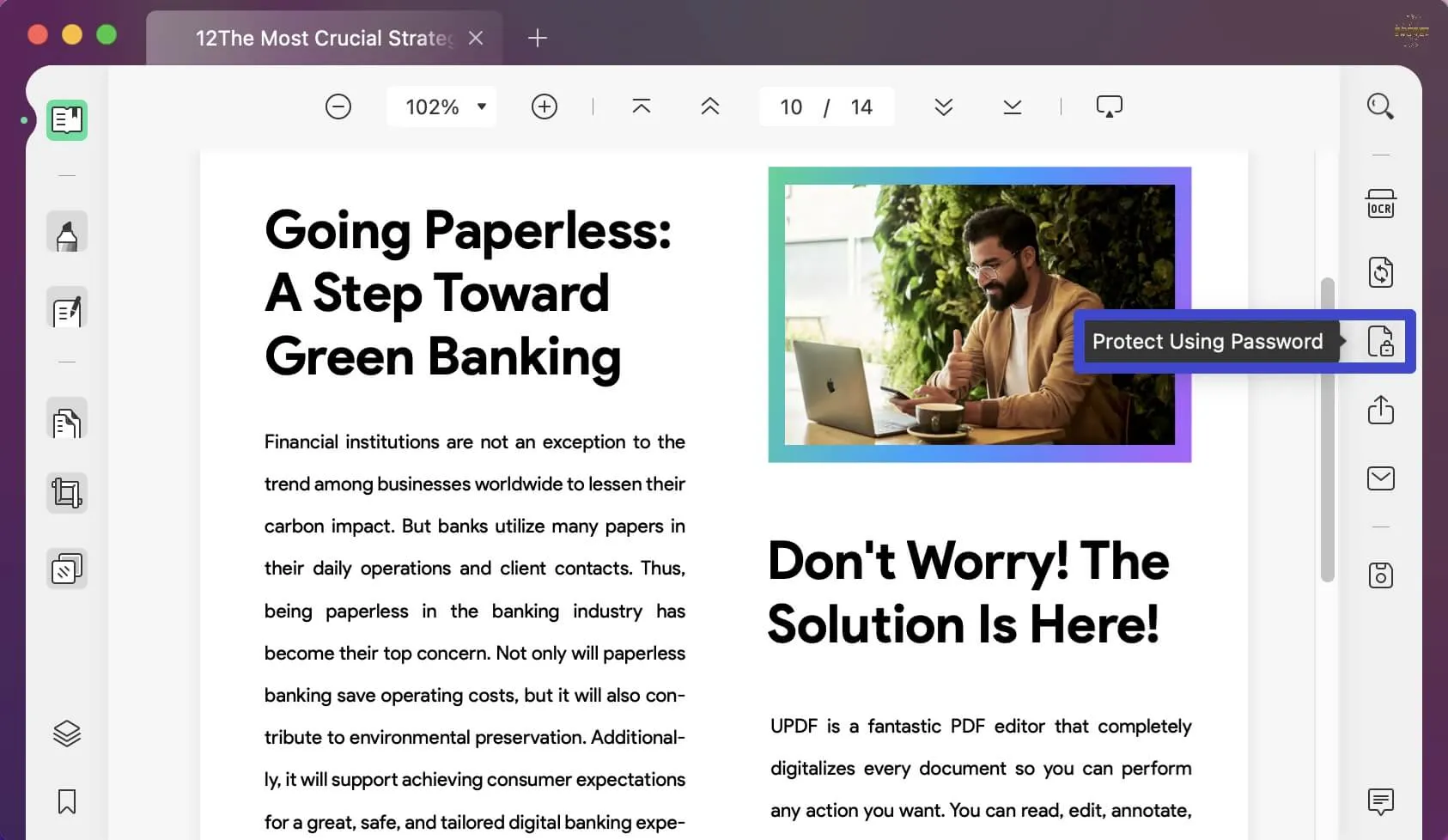
Some of the most impressive features of UPDF are:
- Extensive editing, allowing you to modify images, text, pages, links, etc.
- Present your presentation intuitively which enables you to highlight specific content in the slide while showing the slideshow.
- Modifying text size, color, font, etc., without changing the original format.
- Changes that you want in images, such as rotating, deleting, adding, replacing, etc.
- Attractive annotations, such as highlights, underlines, strikethroughs, stickers, etc.
- Convert your PDF document to a popular format, such as PowerPoint, Excel, etc, with OCR.
To protect your Presentation with a password, you have to convert your PPT to PDF first. Then, follow the steps below to set up a password for your presentation files.
Method 1. Setting Up a Password for Editing Permissions
Step 1: Download and launch UPDF on Windows and open the desired PDF file you want to protect.
Windows • macOS • iOS • Android 100% secure
Step 2: Click Protect Using Password on the toolbar on the right. Open the Encrypt with Password option and click Permissions on the 2nd spot.
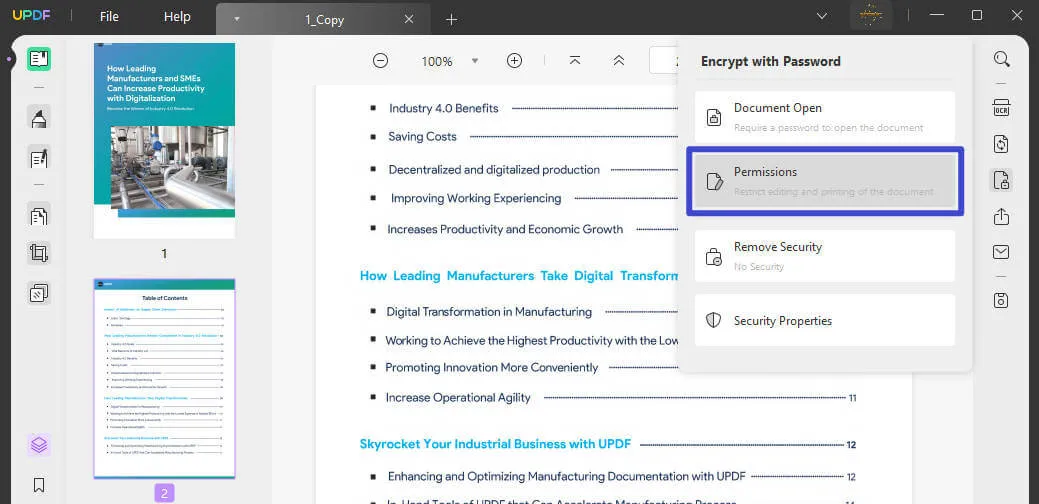
Step 3: Insert the password of your choice to protect your file. You'll also have to enter the password a second time to confirm encryption.
You can customize the restrictions placed on your file by clicking More Options. UPDF allows you to set editing, printing, and copying permissions separately.
- To prevent others from printing your file, open Printing Allowed and click Not Allowed.
- To restrict the copying, uncheck Enable copying of text, images, and other content.
- UPDF also lets you change to Encryption Level, including 128-bit RC4, 128-bit AES, and 256-bit AES.
Once you have calibrated the setting, click on the purple Apply button and lock the Editing, Printing, and Copying settings.
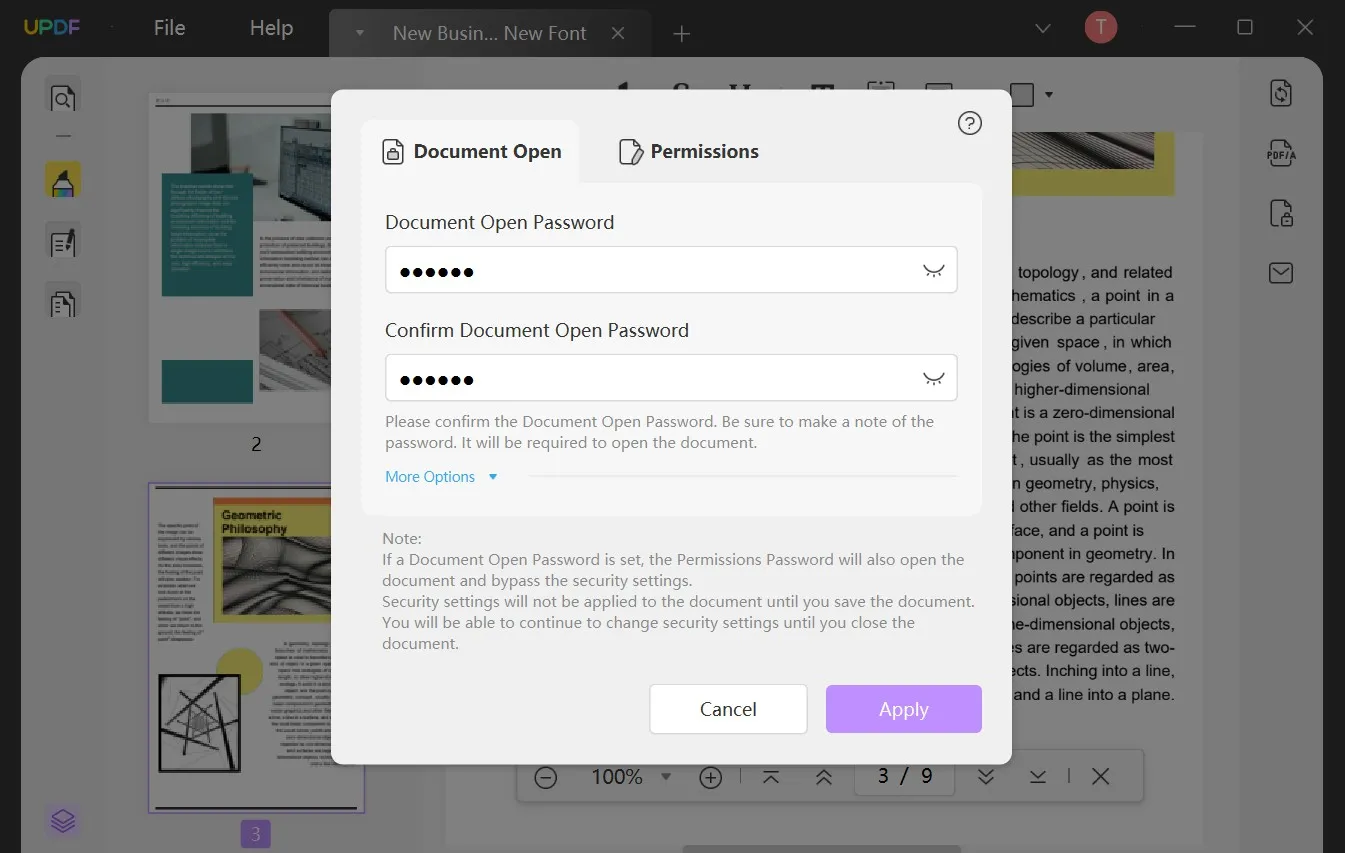
Method 2. Setting Up a Password for Editing Permissions
Here's another method to protect your PDF files from editing, copying, and printing in UPDF.
Step 1: Push the Share button on the right bar and turn on Disable Copy/Print/Download. Create a read-only link to your PDF document to share with others.
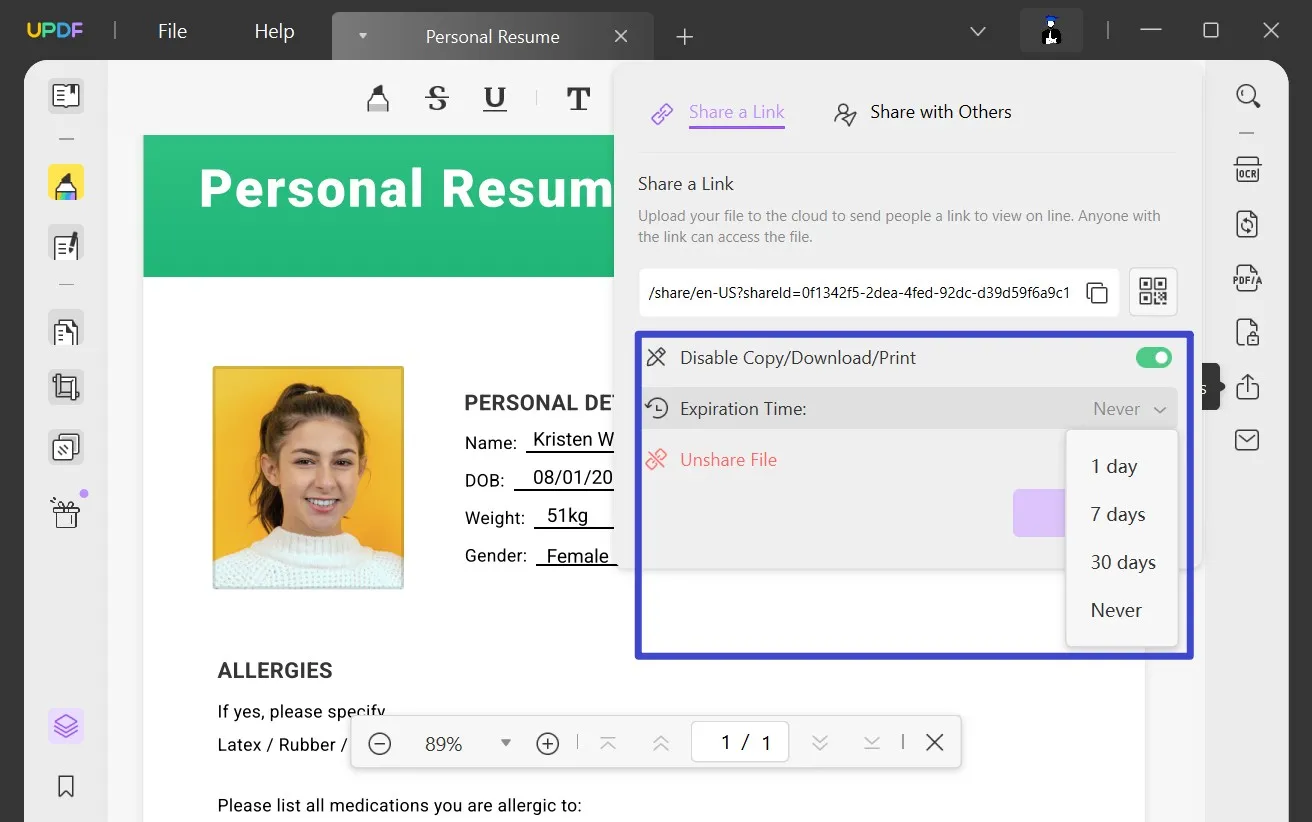
Step 2: Copy and share the link with others so they can only access a read-only version of your document.
Windows • macOS • iOS • Android 100% secure
Part 3. Password Protect PowerPoint with Other Common Ways (Restrict Editing/Accessing Only)
Besides using UPDF, there are some other methods you can try to protect your PowerPoint files.
Method 1. Setting Up a Password
Windows allows you to password-protect PowerPoint files with the following method:
- Click File to access the Backstage view.
- Click Info at the left bar and select Protect Presentation.
- Choose to Encrypt with Password in the drop-down menu. Enter the preferred password in the password box and select OK.
- PowerPoint will ask you to re-enter the password to confirm it.
- Push the Save button to save the file and bring the changes into effect.
Method 2. Restricting Access
This method prevents others from editing your PowerPoint files. Following it'll allow only specific people to edit your document. But, it won't password-protect PowerPoint. To restrict access, follow the first two steps in the first method and the steps described below.
- Open PowerPoint and click File to enter the backend view.
- Click Info on the left bar and open Protect Presentation, and click Restrict Access.
- A pop-up window will show up where you must click Restrict permission to this presentation.
- Now add the recipient's email address in the Read box, ensuring they cannot edit it. Hit OK at the bottom of the pop-up to confirm your choices.
By following this method, you have ensured that only specific users can read your document.
Part 4. FAQs About Password Protect PowerPoint
Q1. How can I remove a password from a PPT file?
- Open the PPT file, click Read-only recommend, and hit OK.
- Click Yes on the prompt that appears.
- Select File in the top-left corner and click Info in the drop-down menu.
- Click Protect Presentation > Encrypt with Password > Remove Password.
Q2. How do you password protect a PowerPoint presentation on a Mac?
Here's how to password protect PowerPoint on a Mac:
- Open MS PowerPoint on your Mac and click File > Passwords.
- Check Encrypt this presentation and require a password box.
- A new password field will open where you need to type and re-type the password to verify.
- Click Set Password and OK to save your commands.
Q3. Can I password protect a Microsoft PDF?
You can protect your Microsoft PDF with a password through different methods. The best among them is UPDF, a comprehensive PDF program with incredible features, such as editing, annotating, and sharing. You can also use the native methods provided by MS Windows.
Conclusion
Converting your PowerPoint files to PDF has many benefits, including flexibility, smaller size, and added security. Once you have done the conversion, using a robust PDF program like UPDF to encrypt your file is crucial. You only need to follow the aforementioned simple steps in UPDF to protect your converted files.
With its simple UI and intuitive features, you can quickly convert your PPT files to PDF. So, download it today and password-protect PowerPoint without any hassle.
Windows • macOS • iOS • Android 100% secure
 UPDF
UPDF
 UPDF for Windows
UPDF for Windows UPDF for Mac
UPDF for Mac UPDF for iPhone/iPad
UPDF for iPhone/iPad UPDF for Android
UPDF for Android UPDF AI Online
UPDF AI Online UPDF Sign
UPDF Sign Edit PDF
Edit PDF Annotate PDF
Annotate PDF Create PDF
Create PDF PDF Form
PDF Form Edit links
Edit links Convert PDF
Convert PDF OCR
OCR PDF to Word
PDF to Word PDF to Image
PDF to Image PDF to Excel
PDF to Excel Organize PDF
Organize PDF Merge PDF
Merge PDF Split PDF
Split PDF Crop PDF
Crop PDF Rotate PDF
Rotate PDF Protect PDF
Protect PDF Sign PDF
Sign PDF Redact PDF
Redact PDF Sanitize PDF
Sanitize PDF Remove Security
Remove Security Read PDF
Read PDF UPDF Cloud
UPDF Cloud Compress PDF
Compress PDF Print PDF
Print PDF Batch Process
Batch Process About UPDF AI
About UPDF AI UPDF AI Solutions
UPDF AI Solutions AI User Guide
AI User Guide FAQ about UPDF AI
FAQ about UPDF AI Summarize PDF
Summarize PDF Translate PDF
Translate PDF Chat with PDF
Chat with PDF Chat with AI
Chat with AI Chat with image
Chat with image PDF to Mind Map
PDF to Mind Map Explain PDF
Explain PDF PDF AI Tools
PDF AI Tools Image AI Tools
Image AI Tools AI Chat Tools
AI Chat Tools AI Writing Tools
AI Writing Tools AI Study Tools
AI Study Tools AI Working Tools
AI Working Tools Other AI Tools
Other AI Tools PDF to Word
PDF to Word PDF to Excel
PDF to Excel PDF to PowerPoint
PDF to PowerPoint User Guide
User Guide UPDF Tricks
UPDF Tricks FAQs
FAQs UPDF Reviews
UPDF Reviews Download Center
Download Center Blog
Blog Newsroom
Newsroom Tech Spec
Tech Spec Updates
Updates UPDF vs. Adobe Acrobat
UPDF vs. Adobe Acrobat UPDF vs. Foxit
UPDF vs. Foxit UPDF vs. PDF Expert
UPDF vs. PDF Expert


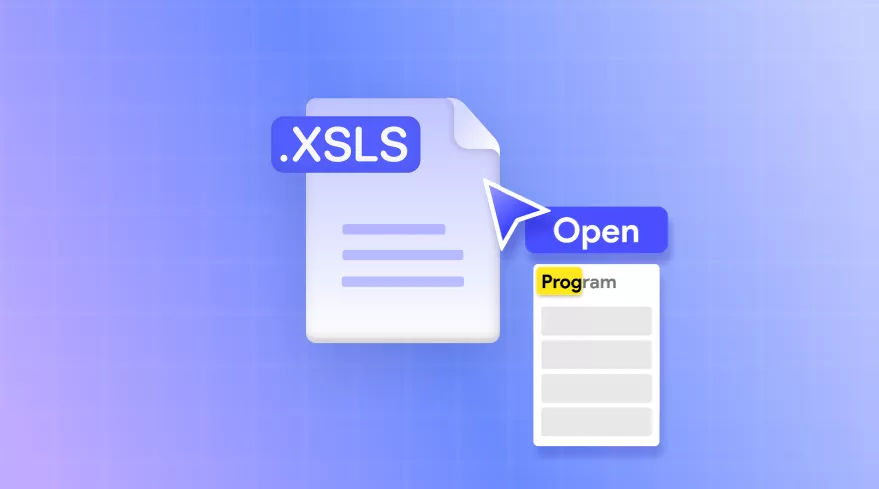







 Delia Meyer
Delia Meyer 
